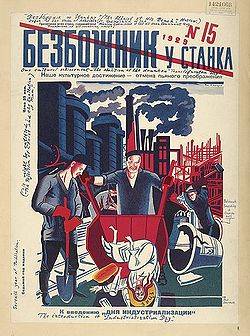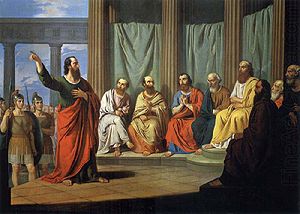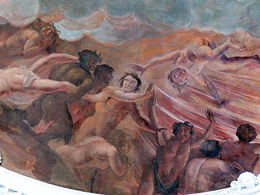Atheophobia
 From Conservapedia
From Conservapedia 
Atheophobia is a fear and/or hatred of atheism/atheists.[1][2]
Concerning distrust of atheists, sociological research indicates that atheists are widely distrusted in both religious cultures and nonreligious cultures.[3][4][5][6] According to a study published in the International Journal for The Psychology of Religion: "anti-atheist prejudice is not confined either to dominantly religious countries or to religious individuals, but rather appears to be a robust judgment about atheists."[5] The study found that many atheists do not trust other atheists as well.[5]
Various atheists have attempted to change the public's perception of atheism and atheists, but their efforts were largely unsuccessful (see: Attempts to positively rebrand atheism).
Militant atheism and atheophobia[edit]
See also: Militant atheism and Atheism and intolerance
Historically, atheism has generally been an integral part of communist ideology (see: Atheism and communism). Communists engage in religious persecution (see: Communism and religious persecution). In addition, atheistic communist regimes engaged in mass murder in the 20th century (see: Atheism and mass murder). Militant atheism is one of the causes of atheophobia.
Recently the term militant atheist has been used to describe adherents of the New Atheism movement,[7] which is characterized by the belief that religion "should not simply be tolerated but should be countered, criticized and exposed."[8][9][10] The intolerance of atheists who are antitheists is also a cause of atheophobia (see: Atheism and intolerance).
Contents
- 1 Militant atheism and atheophobia
- 2 Fear of atheism/atheists unjustifiable
- 3 Hatred of atheism
- 4 Hatred of atheists
- 5 Fear of death and distrust of atheists
- 6 Theophobia among atheists
- 7 See also
- 8 External links
- 9 Notes
Fear of atheism/atheists unjustifiable[edit]
Fear of atheism unjustifiable[edit]

A fear of atheism is unjustified given that atheism lacks proof and evidence that it is true and due to the fact that Christianity has an abundance of evidence to support its veracity (see: Christian apologetics and Refutations of atheism and Criticisms of atheism). The most rational response of Christians to atheism is to engage in Christian evangelism, disseminate Christian apologetics material and to use various means to thwart state atheist indoctrination in their societies.
Given the lack of substance of atheism, it is not surprising that atheism has a low retention rate among those raised in atheist households in the United States and many people are abandoning atheism in communist China and former communist countries (see: Atheism and its retention rate in individuals and Desecularization and Global atheism). A 2012 study by the General Social Survey of the social science research organization NORC at the University of Chicago found that belief in God rises with age, even in atheistic nations (see: Atheism and immaturity).[12]
Fear of atheists unjustifiable[edit]
Atheism, as defined by the Stanford Encyclopedia of Philosophy, the Routledge Encyclopedia of Philosophy, and other philosophy reference works, is the denial of the existence of God.[13] A fear of atheists is also unwarranted given the cowardly nature of most atheists and their inability to intellectually justify their denial of the existence of God (see: Atheism and cowardice).
Furthermore, the Bible teaches "The wicked flee when no one pursues, but the righteous are bold as a lion." (Proverbs 28:1). In addition, the Bible instructs "The fear of man brings a snare, But he who trusts in the Lord will be exalted." (Proverbs 29:25).
Militant atheists using the power of the state to spread atheism[edit]

According to the University of Cambridge, historically, the "most notable spread of atheism was achieved through the success of the 1917 Russian Revolution, which brought the Marxist-Leninists to power."[14] Vitalij Lazarʹevič Ginzburg, a Soviet physicist, wrote that the "Bolshevik communists were not merely atheists but, according to Lenin's terminology, militant atheists."[15] However, prior to this, the Reign of Terror of the French Revolution established an atheist state, with the official ideology being the Cult of Reason; during this time thousands of believers were suppressed and executed by the guillotine.[16]
However, state atheism ultimately came to end in Russia and the satellite nations of the former Soviet Union due to the collapse of Soviet communism/empire (see: Collapse of atheism in the former Soviet Union).
China's state atheism is under siege due to Christianity seeing rapid growth throughout China (See: Growth of Christianity in China).
Atheist indoctrination in the Western World through educational systems[edit]
In the Western World, given the apathy and timidity of many atheists, generally speaking, most atheists do not engage in street evangelism, door to door evangelism and other evangelism approaches which require boldness. As a result, militant atheists have often chosen to use the power of state to advance atheist indoctrination using methods such as educational systems.
Internet atheism[edit]
Another approach that atheists often engage in order to spread atheistic beliefs is the internet (See: Internet atheism). Internet atheists have developed a reputation for being ill-mannered and bullying on the internet (see: Atheism and profanity and Atheist bullying and Atheism and social intelligence and Internet atheism).
Hatred of atheism[edit]

The Apostle Paul taught "Hate what is evil; cling to what is good" (Romans 12:9). Since atheism is evil and has produced and abundance of evil works in history, hating atheism is entirely justified (see: Atheism and mass murder and Atheism and morality and Atheist population and immorality).
Hatred of atheists[edit]
Persecution of atheists[edit]
See also: Persecution of atheists
As atheism vs. Islam conflict has increased in the world, there are growing reports of Islamic governments imprisoning/executing atheists and radical Islamacists killing atheists, but they are still relatively few in number.[17] For more information, please see: Persecution of atheists
Hate crimes in the United States against atheists/agnostics are very low in number[edit]
According to a 2007 Pew Forum survey, about 4% of Americans are atheists/agnostics.[18] A 2008 Gallup poll showed that 6% of the U.S. population believed that no god or universal spirit exists.[19]
According to 2013 FBI statistics, 6/10 of a percent of hates crimes were against atheists/agnostics.[20][21]
Low amount of atheist martyrdom compared to Christendom[edit]
Protestant Christianity published the book the widely read book Foxe's Book of Martyrs. There is no "Atheists book of martyrs".
In addition, Christians currently experience the greatest amount of persecution in the world given that Christianity is the most geographically diverse religious community in the world and Christians are a minority in many countries. See: Christian persecution
The majority of violence against atheists occurs in Muslim countries (see: History, violence, atheism and Islam).
Christian patience, forgiveness and long-suffering towards atheists[edit]
See also: Christian patience, forgiveness and long-suffering towards atheists
Although it is not reported in the press often, due the press preferring to focus on controversy and conflict, as it garners more viewership/readers, many Christians quietly pray for atheists/agnostics - even those of the militant variety such as Richard Dawkins.[22] The late atheist Christopher Hitchens had many Christians praying for him before he passed away and were saddened when he died.[23]
Richard Wurmbrand, who endured years of torture by an atheistic communist government and wrote the wrote the book Tortured for Christ, indicated that he had a compassion even for those who tortured him by "looking at men .. not as they are, but as they will be ... I could also see in our persecutors ... a future Apostle Paul ... (and) the jailer in Philippi who became a convert."[24]
Jesus Christ said pray for those who persecute you and love your enemies (Matthew 5:44).
Hatred of atheists by non-Christians and immature Christians[edit]
See also: Views on atheists and Atheism and social outcasts
Atheism is an arrogant ideology which has a lot of arrogant, angry, quarrelsome and immoral adherents (see: Atheism and arrogance and Atheism and anger and Atheism and social intelligence and Atheist population and immorality and Atheism and love). As a result, atheists often create a lot antipathy towards themselves - especially atheists who are militant atheists/misotheists (see: Views on atheists).
In addition, in the United States, many American atheists are leftists who engage in identity politics. As a result, many atheists like to whine about how they are viewed negatively in society which has a tendency to foster additional antipathy towards them (See Atheist whining). Given the foolish nature of atheism and given that atheists in the United States tend to be white males, identity politics has not gained much traction in the political realm (see: Western atheism and race and Atheism and women). Furthermore, many conservative theists dislike that fact that atheists have engaged in pushing their ideology in the educational system (see: Atheist indoctrination).
Fear of death and distrust of atheists[edit]
See also: Atheism and death and Views on atheists

The very religious fear death the least (see: Atheism and death anxiety and Atheism and death).
However, there is research suggesting that among religious people who fear death, antagonism toward atheists can be driven by their fear of death.[26]
An abstract of the Sage journal article What If They’re Right About the Afterlife? Evidence of the Role of Existential Threat on Anti-Atheist Prejudice by Corey L. Cook, Florette Cohen and Sheldon Solomon indicates:
| “ | Terror management theory posits that the uniquely human awareness of death gives rise to potentially paralyzing terror that is assuaged by embracing cultural worldviews that provide a sense that one is a valuable participant in a meaningful universe. We propose that pervasive and pronounced anti-atheist prejudices stem, in part, from the existential threat posed by conflicting worldview beliefs. Two studies were conducted to establish that existential concerns contribute to anti-atheist sentiments. Experiment 1 found that a subtle reminder of death increased disparagement, social distancing, and distrust of atheists. Experiment 2 found that asking people to think about atheism increased the accessibility of implicit death thoughts. These studies provide the first empirical link between existential concerns and anti-atheist prejudices[27] | ” |
Discover magazine wrote about the study by Corey L. Cook, Florette Cohen and Sheldon Solomon:
| “ | These death thoughts help trigger a subconscious dislike of atheists, said study leader Corey Cook, a social psychologist at the University of Washington, Tacoma. Not only do thoughts of death put people in a negative frame of mind, Cook told Live Science, but they also prompt people to hold more tightly onto their own values.[28] | ” |
Theophobia among atheists[edit]

Theophobia is a fear of religion and/or God/gods. A portion of atheists fear God and the existence of Hell plays a role in this matter (see: Atheism and Hell).
For example, the journalist and ex-atheist Peter Hitchens, who is the brother of the late atheist Christopher Hitchens, said upon seeing an art exhibit of Michelangelo's painting The Last Judgment he came to the realization that he might be judged which startled him.[29] This started a train of thought within Peter Hichens that eventually led him to become a Christian.[30]
For more information, please see: Atheism and Hell.
New Atheists and accusations of Islamophobia[edit]
The New Atheists Richard Dawkins, Sam Harris and the late Christopher Hitchens have received multiple accusations of engaging in Islamophobic behavior.[31] On the other hand, defenders of atheist criticisms of Islam/Muslims indicated that New Atheists should be able to criticize Islam without being accused of Islamophobia.[32]
See also[edit]
- Blasphemy laws
- Sociology of "atheism is un-American" view
- Atheism and death anxiety
- Atheism and loneliness
- Closet atheist
- Atheology
External links[edit]
Decline of global atheism:
- Think religion is in decline? Look at who is ‘going forth and multiplying’ - Vancouver Sun, October 12, 2014
- A number of academic journals now indicate that global atheism/agnosticism is shrinking in influence
- Shall the Religious Inherit the Earth?: Demography and Politics in the Twenty-First Century by Eric Kaufmann, Belfer Center, Harvard University/Birkbeck College, University of London
- What does the historical record say about how fast secularism can collapse in countries?
- Global decline of atheism and the rise of global creationism
Notes[edit]
- ↑ Atheophobia
- ↑ Definition of atheophobia at Allwords.com
- ↑ Study: Atheists distrusted as much as rapists
- ↑ Atheists Widely Distrusted, Even Among Themselves, UK Study Finds, Christian Post, 2015
- ↑ 5.0 5.1 5.2 Anti-atheist distrust ‘deeply and culturally ingrained’, study finds, The Independent, 2015
- ↑ Edgell, Gerteis & Hartmann 2006
- ↑ Ian H. Hutchinson. Ian Hutchinson on the New Atheists. BioLogos Foundation. Retrieved on 29 September 2011. “Ian Hutchinson tells us in this video discussion that New Atheism -- a term used to describe recent intellectual attacks against religion -- is actually a misnomer. It is better, he says, to call the movement “Militant Atheism”. In fact, the arguments made by New Atheists are not new at all, but rather extensions of intellectual threads which have existed since the late 19th century. The only unique quality of this movement is the degree of criticism and edge with which its members write and speak about religion. According to Hutchinson, the books written by New Atheists in the past decade simply restate many of the same arguments which have emanated from atheist thinkers for decades. The militant edge of these arguments is what makes “New” Atheism unique and elevates it to a level of popularity within a subset of the population. It is because these Militant Atheists show no respect at all for religion, says Hutchinson, that they are receiving status as a new movement.”
- ↑ Simon Hooper. The rise of the 'New Atheists'. Cable News Network (CNN). Retrieved on 10 March 2011. “What the New Atheists share is a belief that religion should not simply be tolerated but should be countered, criticized and exposed by rational argument wherever its influence arises.”
- ↑ Amarnath Amarasingam. Religion and the New Atheism (Studies in Critical Social Sciences: Studies in Critical Research on Religion 1). Brill Academic Publishers. Retrieved on 10 March 2011. “For the new atheists, tolerance of intolerance (often presented in the guise of relativism of multiculturalism) is one of the greatest dangers in contemporary society.”
- ↑ Stephen Prothero. God Is Not One: The Eight Rival Religions That Run the World--and Why Their Differences Matter. HarperOne. Retrieved on 10 March 2011. “For these New Atheists and their acolytes, the problem is not religious fanaticism. The problem is religion itlself. So-called moderates only spread the "mind viruses" of religion by making them appear to be less authoritarian, misogynistic, and irrational than they actually are.”
- ↑ http://www.christianpost.com/news/study-atheists-have-lowest-retention-rate-compared-to-religious-groups-78029/ Study: Atheists Have Lowest 'Retention Rate' Compared to Religious Groups
- ↑ Belief in God rises with age, even in atheist nations
- ↑ Multiple references:
- Smart, J. J. C. (August 8, 2011). "Atheism and agnosticism". The Stanford Encyclopedia of Philosophy (Spring 2013 Edition), Edward N. Zalta (ed.). Retrieved July 17, 2014.
- Sarfati, Jonathan, Ph.D. (23 June 2007). "Atheism is more rational?". Retrieved July 17, 2014. See Creation Ministries International, Jonathan Sarfati.
- Day, Donn R. (2007). "Atheism - etymology". Retrieved July 15, 2014.
- ↑ Investigating atheism: Marxism. University of Cambridge (2008). Retrieved on July 17, 2014. “The most notable spread of atheism was achieved through the success of the 1917 Russian Revolution, which brought the Marxist-Leninists to power. For the first time in history, atheism thus became the official ideology of a state.”
- ↑ Vitalij Lazarʹevič Ginzburg (2009). On Superconductivity and Superfluidity: A Scientific Autobiography. Springer Science+Business Media, 161. Retrieved on July 17, 2014. “The Bolshevik communists were not merely atheists but, according to Lenin's terminology, militant atheists.”
- ↑ Multiple references:
"It is wonderful that, amid the horrors of this dismal period, while 'the death dance of democratic revolution' was still in rapid movement, among the tears of affliction, and the cries of despair, 'the masque, the song, the theatric scene, the buffoon laughter, went on as regularly as in the gay hour of festive peace.'”
"It's this second Enlightenment tradition that Cardinal Ratzinger referred to when he wrote, 'The radical detachment of the Enlightenment philosophy from its roots ultimately leads it to dispense with man.' Actually this transition happened not 'ultimately' but almost immediately. The first instance occurred when Enlightenment worship of abstract 'reason' and 'liberty' degenerated quickly into the mass murders committed during the antireligious Reign of Terror in France. 'Liberty, what crimes are committed in your name', said Madam Rolande as she faced the statue of Liberty in the Place de la Revolution movements before her death at the guillotine. She was one of the early victims of a succession of secular systems based on rootless notions of 'liberty', 'equality', and 'reason'.
"As many historians have pointed out, the atheist regimes of modern times are guilty of far more crimes than any committed in the name of religion. Communist governments alone were guilty of more than one hundred million murders, most of them committed against their own people.” - ↑
- Atheists: the new persecuted minority, international report concludes (COMMENTARY) by Bob Churchill | Religion News|December 17, 2014
- Bangladesh struck by wave of atheist blogger murders, France 24 News, 1/04/2015 / BANGLADESH
- Atheists around world suffer persecution, discrimination: report By Robert Evans, Reuters, Sun Dec 9, 2012 9:20pm EST
- ↑ Pew Forum Religious Landscape Survey - Key findings
- ↑ Belief in God Far Lower in Western U.S. Gallup.com. Retrieved on 2012-02-05.
- ↑ 2013 FBI hate crime statistics
- ↑ Atheism: The Next Civil Rights movement, Vlad Chituc, The Daily Beast, 4-6-2015
- ↑ Richard Dawkins upset that public doesn’t like him by Warren Nunn, Published by Creation Ministries International 13 May 2014 (GMT+10)
- ↑ Christians Grieve Death of Christopher Hitchens; Share Hopes for Deathbed Conversion by Eryn Sun, Christian Post Reporter, December 16, 2011
- ↑ dc Talk and The Voice of the Martyrs. Jesus Freaks: Stories of those who stood for Jesus: the ultimate Jesus Freaks. Bethany House Publishers, 1999, p. 67
- ↑ Fear of death: worst if you’re a little religious?, World of Science]
- J Gerontol B Psychol Sci Soc Sci. 2005, Jul;60(4):P207-14. Does religiousness buffer against the fear of death and dying in late adulthood? Findings from a longitudinal study. Wink P1, Scott J.
- ↑ What If They’re Right About the Afterlife? Evidence of the Role of Existential Threat on Anti-Atheist Prejudice by Corey L. Cook, Florette Cohen, Sheldon Solomon, Sage
- ↑ What If They’re Right About the Afterlife? Evidence of the Role of Existential Threat on Anti-Atheist Prejudice by Corey L. Cook, Florette Cohen, Sheldon Solomon, Sage
- ↑ Atheists Inspire Thoughts of Death in Many Americans by Stephanie Pappas, LiveScience, Discover magazine, May 23, 2015 09:25 AM ET
- ↑ Interview of Peter Hitchens - Video at Vimeo
- ↑ Interview of Peter Hitchens - Video at Vimeo
- ↑
- Dawkins, Harris, Hitchens: New Atheists flirt with Islamophobia by Nathan Lean, Salon, March 30, 2013
- Sam Harris, the New Atheists, and anti-Muslim animus by Glenn Greenwald, The Guardian, April 3, 2013
- ↑ New Atheism should be able to criticise Islam without being accused of Islamophobia by Andrew Zak Williams, New Statesman, Published 19 April 2013
Categories: [Religion] [Atheism] [Psychology] [Featured articles]
↧ Download as ZWI file | Last modified: 02/11/2023 13:54:14 | 11 views
☰ Source: https://www.conservapedia.com/Atheophobia | License: CC BY-SA 3.0
 ZWI signed:
ZWI signed: KSF
KSF